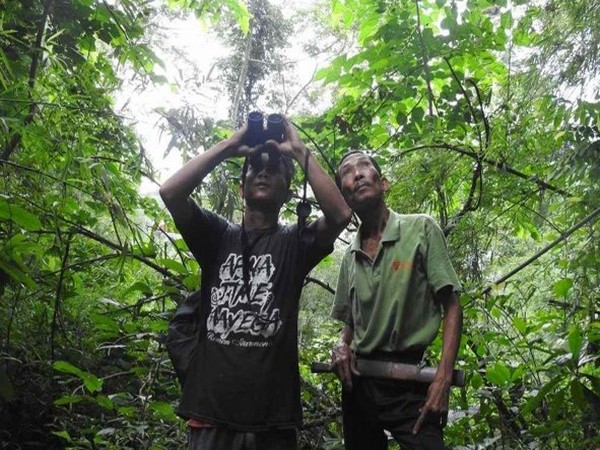Arunachal Pradesh: The Nyishi Tribe and their quest to save Hornbills
One of the prominent tribes that have been instrumental in shaping this cultural landscape is the Nyishi Tribe, who is standing out as the vanguard of ecological conservation, with their community-driven 'Protect Hornbills Project'.

- Country:
- India
Arunachal Pradesh is considered a land of vibrant ethnic diversity, pristine natural beauty, and rich cultural heritage, and one of the prominent tribes that have been instrumental in shaping this cultural landscape is the Nyishi Tribe, who is standing out as the vanguard of ecological conservation, with their community-driven 'Protect Hornbills Project'. With a history that dates back centuries, the Nyishis have been weaving a tapestry of traditions, rituals, and practices that are intrinsically tied to the land they inhabit.
The Nyishi Tribe is the largest ethnic group in Arunachal Pradesh, primarily residing in the districts of Papum Pare, Kurung Kumey, East Kameng, and parts of Lower Subansiri. Though the exact origin of the Nyishis is a matter of debate among scholars, it is widely believed that they descended from the Tibeto-Burman linguistic group. Over the centuries, the Nyishis have developed their distinct socio-cultural identity, with their unique dialect, attire, customs, and beliefs.
The Nyishis have been living in harmony with their surroundings for centuries, drawing sustenance and wisdom from the land. Their reverence for nature is evident in their daily lives, where they practice sustainable agriculture, and their spiritual beliefs, where they worship the Sun and Moon, alongside other deities. This deep-rooted connection with the environment has led to the development of a strong conservation ethic within the community. The Nyishis' affinity for the Great Hornbill can be traced back to their folklore and mythology, where the bird is revered for its beauty and wisdom.
The tribe's headgear, called the 'Bopia' is adorned with the bird's beak and feathers, symbolizing the wearer's connection with the avian deity. However, in recent times, the Great Hornbill has been facing threats from habitat loss, poaching, and climate change. In response to these challenges, the Nyishi community, in collaboration with conservation organizations, has embarked on a mission to protect and conserve the Great Hornbill.
The Protect Hornbills Project comprises several initiatives. One of the main initiatives includes Community-based nest adoption and monitoring. Under this, local Nyishi villagers are trained and employed to monitor and protect hornbill nests in their vicinity, thereby ensuring the survival of the next generation of the species.
Another initiative is the alternative livelihoods, where the project encourages sustainable livelihood options for the Nyishi people, such as ecotourism and handicrafts, reducing their dependence on forest resources and minimizing the threats to the hornbills' habitat. The project also focuses on awareness and education. Under this, it invests in educating the community, particularly the younger generation, about the importance of hornbills and their conservation. Traditional storytelling, folk songs, and school programs are employed to instil a sense of pride and responsibility towards the protection of the species.
In addition to this, the project also aims at cultural revival, by promoting the use of alternative materials for the traditional headgear, such as fibreglass replicas of the hornbill beak, the project aims to reduce the demand for real hornbill parts, thereby curbing poaching and ensuring the cultural significance of the bird is preserved. Habitat restoration is also an area of the project. It focuses on the restoration of degraded habitats and the creation of wildlife corridors, enabling the Great Hornbill and other species to thrive in a healthy ecosystem.
The Nyishi Tribe's commitment to the Protect Hornbills Project is a testament to their deep-rooted conservation values and the cultural importance of the Great Hornbill. This community-led initiative is a shining example of how indigenous wisdom, when combined with modern conservation techniques, can make a significant impact in protecting endangered species and their habitats. In addition to their environmental stewardship, the Nyishi Tribe is also renowned for its vibrant cultural practices.
The Nyokum Festival, held annually in February, is a time of joy and celebration for the community, as they come together to express gratitude to the gods for a bountiful harvest. The festival is marked by traditional dances, songs, and feasting, with the Nyishi people donning their colourful traditional attire, showcasing their rich heritage. The Nyishi Tribe's story is one of resilience, adaptation, and a profound connection with nature. Their Protect Hornbills Project, their vibrant cultural practices, and their indomitable spirit serve as an inspiration to the world, reminding us of the power of unity and the importance of living in harmony with the environment.
As the guardians of the hornbills and the keepers of ancient wisdom, the Nyishi Tribe stands tall as a beacon of hope for a sustainable future, where communities and ecosystems can coexist and thrive. By celebrating and supporting their unique traditions and conservation efforts, we can ensure the continued flourishing of this remarkable tribe and the environment they hold so dear. (ANI)
(This story has not been edited by Devdiscourse staff and is auto-generated from a syndicated feed.)










